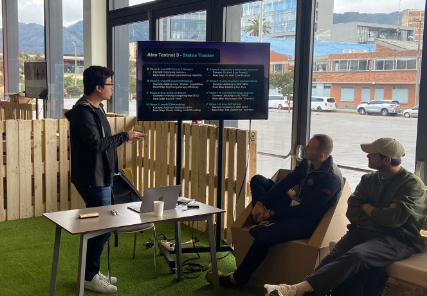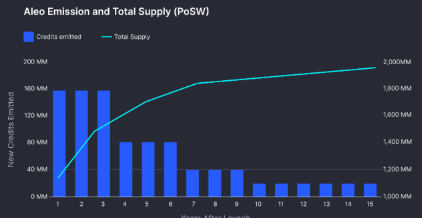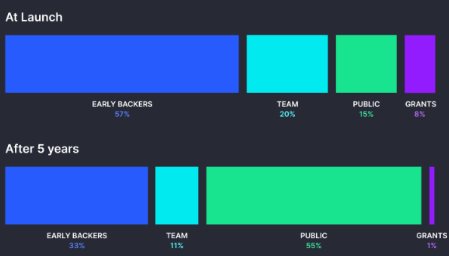Tiền pháp định
Các loại tiền điện tử
Không có kết quả cho ""
Chúng tôi không thể tìm thấy bất cứ thứ gì trùng khớp với tìm kiếm của bạn.Hãy thử lại bằng một cụm từ khác.
What Is Aleo Blockchain?
What Is Aleo?
Founded in 2019, Aleo accelerates the integration of zero-knowledge into the web3 world. Aleo is the leading developer platform for building fully-private, scalable, and cost-effective decentralized applications. Using zero-knowledge cryptography, Aleo moves smart contract execution off-chain to enable new use cases like identity, finance, and gaming, scaling to thousands of transactions per second. Built on a decentralized and permissionless blockchain, Aleo brings the flexibility of Ethereum with a more scalable architecture that's designed from the ground up for privacy.
Aleo has raised $200M in a Series B funding round led by Kora Management LP and SoftBank Vision Fund 2, culminating in a valuation of the company at $1.45 billion. (More crypto fundraising details can be checked on the CoinCarp Fundraising Database)
Who Are the Founders of Aleo?
The Aleo team is made up of world-class cryptographers, engineers, designers, and operators from companies such as Google, Amazon, and Facebook, as well as well-known universities such as UC Berkeley, Johns Hopkins, NYU, and Cornell. The team members are:
- Howard Wu: Howard Wu is the most active co-founder and has spoken out on various social media. Howard Wu graduated from the University of California, Berkeley, majoring in CS and Math, with bachelor's and master's degrees. Howard worked as a Software Engineer at Google for a year after graduating with an undergraduate degree, then returned to UCB to complete a master's degree, then founded Aleo. Since 2014, he has contributed code for crypto wallets and exchanges, such as ZCash, IPFS, and Ethereum.
- Michael Beller: Michael Beller graduated from Cornell University and has continuous entrepreneurial experience in asset management start-ups. Now Michael serves as Aleo's CFO.
- Collin Chin: Collin Chin also graduated from the University of California, Berkeley. ECE and CS major, responsible for the development of Aleo's programming language Leo. He used to work on Crypto project code Audits.
- Raymond Chu: Ravmond Chu graduated from the University of California, Berkeley, majoring in ECE and CS, and joined Aleo directly after graduation.
- Alex Pruden: Alex Pruden is the Chief Operating Officer (COO) of Aleo and graduated from West Point Military Academy. He worked for a16z from 2019 to 2020, which indirectly promoted A16Z's A-round lead investment in ALEC. In addition, Alex Pruden is also one of the speakers of ALEO's external speech and AMA.

What Are the Main Features of Aleo?
Aleo is the first blockchain to enable fully-private applications, with the following main features:
- Zero-knowledge(ZK) cryptography. A zero-knowledge proof is a cryptographic protocol where one party (the prover) proves to another party (the verifier) that something is true without revealing how it is true. Zero-knowledge allows us to use the internet more powerfully than we do today without leaving extractable traces of our data everywhere. Using zero-knowledge cryptography, Aleo can help put power back into the hands of users instead of the corporate interests that govern it. With a more scalable architecture, miners do not need to re-conduct each transaction.

- PoSW(Proof of Succinct Work) consensus mechanism. Proof of Succinct Work (PoSW) is a consensus protocol that generates proofs on system validity as a useful byprocess of performing Proof-of-Work. The encoded predicate verifies the transactions that will be included in a given block update, while ensuring that the underlying proof computation is still a time-lock puzzle. PoSW is a variant of Bitcoin's SHA-based difficulty adjusting algorithm, with the key difference being that the underlying computation is not an arbitrary hash function but rather a proof of knowledge. This allows the PoSW solution to not only act as PoW to ensure system consensus but also provide verification of transaction inclusion in a given block. PoSW mining is a special case of an application within the broader Aleo programming model. One critical difference between Aleo and other networks such as Ethereum is that fees on the Aleo network are calculable beforehand. On Aleo, there is no concept of "gas" which is what makes programs unpredictably expensive to run on Ethereum. Whereas in Aleo, everyone knows ahead of time exactly how many Aleo credits will be needed to run a given program.
- Leo Programming Language. Leo is a Rust-inspired statically typed programming language built for writing private applications. It is designed for developers to build intuitively on the Aleo blockchain, providing the groundwork for a private, decentralized ecosystem. Leo is designed to remove as many cryptographic knowledge requirements as possible. Leo looks and feels just like a traditional programming language. Yet under the hood, Leo is far more complex. Leo abstracts low-level cryptographic concepts and makes it easy to integrate private applications into your stack.
What Problems Does Aleo Try to Solve?
- Existing blockchains are inadequate for real-world applications. The notion of building smart contract mixers and dark pools on Ethereum remains flawed. Without privacy, these applications cannot fully protect user activity.
- The business model of the web is to provide free services in exchange for personal data. This model is antiquated and puts users at odds with providers. The user is forced to give up their data in exchange for services they want, at the cost of personal privacy. The provider bears the risks for managing user data to provide their service, facing the implications of storing, processing, and reporting it.
How Does Aleo Blockchain Work?
Aleo's architecture combines Ethereum's account model with Zcash's shielded transaction design to achieve fully-private applications in Web3. By using the latest innovations from zero-knowledge cryptography, the combination of these two ideas unlocks a world of new capabilities for Web3 developers. From private DeFi to real-time gaming, Aleo is building a powerful toolkit for developers seeking to deploy real-world applications, and enabling truly personalized experiences for Web3 users.
Does Aleo Have a Token?
Yes, Aleo will issue their native Aleo token. Aleo's tokenonomics is engineered to align incentives across all of the stakeholders in the system in as simple a way as possible in service of the Aleo network. In addition, the team wants to ensure that the Aleo system achieves the following properties: The native token of the network represents meaningful value.
What Is Aleo Token Economics(Tokenomic)?
The native unit of account in the Aleo network is called Aleo credits. These credits are used to pay transaction fees (similar to Bitcoin), and are anticipated to be the preferred currency of "provers" who we expect to run as L2 providers on top of the network. Aleo credits enable access to a key computational resource of the next generation: zero-knowledge compute. Since mining in Proof-of-Succinct Work is proving, Aleo credits are a natural way for the market to price the value of a zero-knowledge proof for an arbitrary program. Therefore, the price of that asset should roughly represent the demand for zero-knowledge compute overall.
- At launch, Aleo credits will be distributed between early backers, builders, and community members as well as a foundation or other entity that will provide grants and ensure the continued development of the network. From genesis, new credits will be minted and distributed to miners on the network via the block reward.

- Aleo sets a relatively higher inflation rate at the beginning, which then halves twice in the first decade. After year nine, a final halving will result in a tail emission of 12.5 Aleo credits per block will be awarded simultaneously to ensure the security of the network, as well as the stability of the economy that it will support.

- Over time, as new credits are minted, the distribution will change.

For more Aleo Tokenomic, please visit: https://www.aleo.org/post/aleo-token-economics
How Is Aleo Different from Monero?
Aleo has a smart contract that allows you to develop applications. However, Monero is only designed as a coin for privacy.
How to Get Aleo Credit Airdrop?
From the Aleo Testnet 3 Announcement, the team has announced 25 million Aleo credits (ALEO) to be distributed across the community of developers, provers, and validators over 3 phases of Testnet 3.
- Developers: Can earn rewards for writing, deploying, and executing programs.
- Hackers: Can earn bounties by identifying bugs in our protocol.
- Provers: Can generate PoSW proofs and earn coinbase rewards.
- Validators: Can participate in block production and consensus as part of AleoBFT and earn rewards from the protocol
Stay tuned to CoinCarp Social Media and Discuss with Us:
Twitter |Telegram |Reddit |Discord
- Venga Takes Proactive Steps Toward EU Compliance with MiCA Pre-Application Sơ cấp 2m
- Singularity Finance Partners with Particle Network to Streamline Blockchain and AI Integration Sơ cấp 2m
- Why Are Telegram Mini-Games The Key To Web3 Gaming Adoption? Sơ cấp 5m
- Official Trump (TRUMP): A Meme Coin Making Waves, Joined by MELANIA Sơ cấp 4m